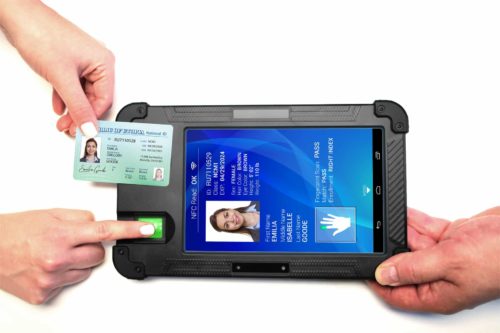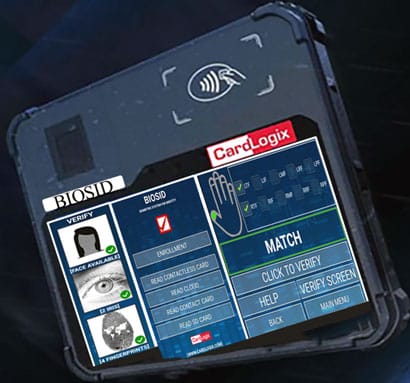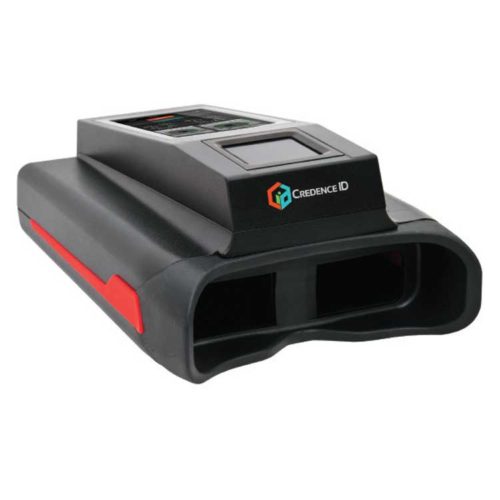September 27, 2011, at the border of Afghanistan and Pakistan, a US military scans the iris of an Afghan, and biometric data is stored in the Automatic Biometric Identification System (ABIS) to prevent the Taliban and other terrorist organizations from the roadside Bomber.
The latest and most advanced biometric technology and military equipment in the United States have now fallen into the hands of the Taliban in Afghanistan , and they have been used by the Taliban to hunt and hunt U.S. ally in Afghanistan. The Taliban leader in charge of the hunt has publicly confirmed this situation.
According to a report by the New York Post on August 27 , the Taliban has mobilized a special force called “Al Isha” to hunt down Afghans who have helped the United States and allied forces in the past 20 years. The Taliban is using advanced equipment from the US military. And the database to do this.
One of the brigade commanders of the Al Isha force is Navazudin. Nawazuddin Haqqani, he boasted in an interview with “Zenger News” that his troops are using American-made handheld scanners to access the huge biometric database built by the United States and actively identify any NATO allies who helped or intelligence cooperation with India over the Afghan people.
Haqqani threatened that those Afghans who tried to deny that they had helped the U.S. military would find that the detailed records in the computer left by the U.S. during the frantic withdrawal of troops contradicted their claims.
US officials have yet to confirm how many of the 7,000 handheld scanners used by the US military in Afghanistan have been discarded there, and whether the biometric database there can be deleted remotely.
The database contains fingerprints, iris scans, and other biographical data and is located in a whitewashed building in the Ministry of Interior in Kabul.
In the past 12 years, almost everyone who has worked with the Afghan government or the U.S. military, including Afghan interpreters, drivers, nurses, and secretaries, has been fingerprinted and scanned for irises and stored in a biometric database.
The United States started with data on approximately 300,000 Afghans in 2009, according to NATO, mainly prisoners and Afghan soldiers. The biometric center in Afghanistan opened in November 2010 and aims to collect information on as many as 25 million Afghans, accounting for about 80% of the Afghan population, but the exact number of Afghans included in the database remains confidential.
The US Federal Bureau of Investigation (FBI) stated in a 2011 press release that the “core of the biometric center is the Afghan Automatic Biometric System (AABIS), managed by approximately 50 Afghans from the Kabul Ministry of Interior.”
At first, the United States hoped to use biometric databases to discover Taliban infiltrators or capture roadside bomb makers, because these bombs have claimed the lives of hundreds of Americans and allies since 2001. Later, the system evolved into the biometric identification of almost every Afghan who was hired or visited by the U.S. military. By 2014, the U.S. Army referred to its strategy as “identity advantage.”
The biological database can also be used to find anyone working with intelligence agencies in the UK, Europe or India.
The sudden withdrawal of US troops from Afghanistan provided an opportunity for the Haqqani brigade to take retaliatory action quickly. Haqqani said: “We are not collecting new data-we already have it, and this unit [Al Isha] is just keeping a close eye on whether anyone has worked for the United States or [the former Afghan government] National Security Agency.”
The National Counter-Terrorism Center of the United States believes that the Haqqani Brigade is “the deadliest and most complex insurgent organization against the United States, coalition and Afghan forces.”
The brigade is a military unit composed of more than 2,000 militants. Named after Khalil Haqqani, the Haqqani family and Ben. Bin Laden has a close relationship. Al Isha is one of the three units under the Haqqani Brigade.
Navazuddin. In a mobile phone call with Zenger News, Haqqani said: “Now that Kabul is occupied and operations are relegated to a secondary position, we have turned our attention to counter-espionage activities. Although most of the brigade’s personnel are now in different positions. The religious school [Islamic religious school] is closed, but the Al Isha unit is now the main institution handling this [biometric] data project.
“We control the Ministry of the Interior and the national biometric database kept by them. We now have data on everyone-including journalists and so-called human rights activists. We haven’t killed a foreign journalist, have we? We haven’t arrested these yet. (On the blacklist) family of people.
“But the puppets of the U.S., NDS [Afghan National Security Agency] and RAW [Indian Research and Analysis Department] will not be let go. Al Isha will always stare at them. Those who said that they had dollars in their pockets until a few days ago ——They will not be spared. They cannot be spared, is it possible?”
Haqqani told Zenger that the size of Al Isha’s troops has more than doubled, from 500 in the past month to nearly 1,100, and expanded to many provinces in 34 provinces in Afghanistan.
When asked whether the report that Pakistani intelligence officials are monitoring the use of biometric data by Al Isha forces to interrogate American allies is real-time, Navazuddin. Haqqani did not deny the connection with Pakistan.
He replied: “You are not so naive-you know the answer. But what I can say is that there is no need to train everyone in Pakistan. The (local Taliban chief) Emirs are very capable of training infantry how to use equipment.”
This shows that Pakistan’s spy agency Inter-Services Intelligence (ISI) can access the US biometric database in Afghanistan. If Al Isha can identify Indian intelligence informants in Afghanistan, Pakistanis will hunt them down .
It is reported that the Biden administration has provided the Taliban with a list of the Americans and Afghans that he wants to evacuate from Afghanistan. A Defense Ministry official told Politico that the move was undoubtedly “to put all Afghans on the killing list.”
The US State Department and the Department of Defense have not commented on these reports. Anton, spokesman for the Pentagon. Lieutenant Colonel Anton Semelroth stated that he would forward the request for comment to “the right person” and did not provide an answer to the media.
State Council Information Officer Nicole. Thompson (Nicole Thompson) stated that these issues are “under treatment” within the agency and have not responded. White House Deputy Press Secretary Karin. Karine Jean-Pierre also did not respond to multiple requests for comment.
Related Products
Related Articles
IDEMIA today launched the new Delaware Mobile ID in partnership with the Delaware Division of Motor Vehicles (DMV)
RESTON, Va., March 9, 2021 -- IDEMIA today launched the new Delaware Mobile ID in partnership with the Delaware Division of Motor Vehicles (DMV). The Delaware Mobile ID app will allow Delaware's 800,000+ licensed drivers and ID cardholders to use their smartphones to manage
Iris ID Mobile Platform Supports TWIC Credentials
Cranbury, N.J.– Nov. 10, 2020 – Iris ID, a leading provider of iris recognition technology, today announced the compatibility of its iCAM M300 handheld, multi-modal biometric reader and the MozaicID iCAM M300 Smartcard Software Credential Application. This application enables the
Papua New Guinea mobile biometric voter enrollment trial with Credence ID successful
15 Oct 2020 -- Papua New Guinea is set to employ an upgraded biometric voter registration system as the country looks forward to its national elections, using a solution which is said to be cost effective, provided by Credence ID.
Samsung Announces the Galaxy Tab Active3, a Smart New Tablet Built for Demanding Environments
September 28, 2020 -- South Korea -- Samsung Electronics today revealed the new Galaxy Tab Active3, a ruggedized tablet based on the popular Tab Active2 design to meet the rigor of today’s mobile workforce with a sleek, compact design for portability.
Fingerprint Cards launches new biometric solution for the PC market
August 11, 2020 02:00 ET -- World-leading biometrics company, Fingerprint Cards AB (Fingerprints™) today launches a new solution for the PC market. Following several successful integrations in Chromebooks, biometric authentication is in increased demand as a more convenient and secure
Goodix’s Innovative Fingerprint Solutions Power Up Samsung Galaxy Tab S7 Series
SHENZHEN, China, Aug. 5, 2020 -- Shenzhen Goodix Technology Co. Ltd., an integrated solution provider offering industry-leading software and hardware semiconductor solutions, announced that its innovative fingerprint solutions achieved remarkable design wins on Samsung Galaxy Tab S7 and Tab S7+




